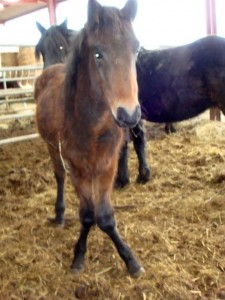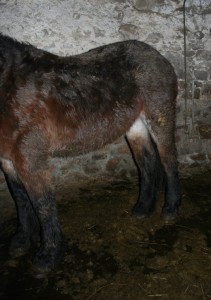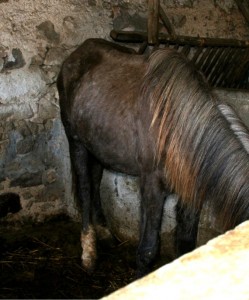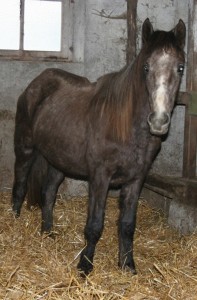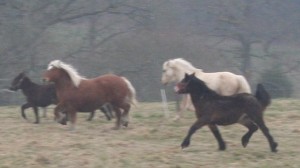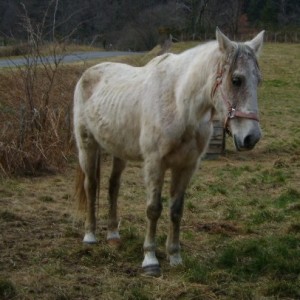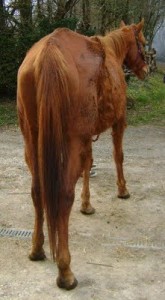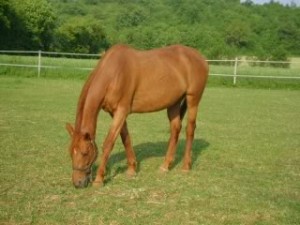Since 2007, we have watched with increasing concern the number of horses being advertised as ‘rescues’ on several new UK websites. Many of these animals were clearly unfit to travel (malnourished, suffering from illnesses or with conformation issues) and were bought by completely unsuitable homes in the UK, whose heartstrings were tugged by a picture on the internet. Many died or were put to sleep soon after transportation with others needing expensive veterinary care to survive.

The poor health of these animals would make them more susceptible to disease, and with the increase in incidence of notifiable diseases in Europe, transporting these equines without health checks was threatening the health of the UK herd.
Even those that appeared to have found good homes often ended up on the dealing circuit or being handed over to sanctuaries already struggling to cope with the burden of unwanted horses in the UK once the enormity of the task of rehabilitating and training these horses overwhelmed their new owners.
All this combined with the clear flouting of welfare regulations along the way meant that ERF needed to take effective action to help these horses.
In March 2009, we had a report from a distraught eye witness about a farm in France holding these ‘rescued’ horses before transport. These are brief extracts from her report ;
In this barn were 7 horses in darkness apart from when the door was opened letting in light …..the horses were stood in deep wet excrement. There was no bedding that I could see only muck and urine mixed to a sloppy mess on the floor………They were all quite thin and I could not see any hay or water buckets in the stables …… One horse looked quite poorly and depressed with long strands of thick green discharge dripping from his nose……. A young grey horse was poor with a very thin coat and had tics plainly visible on its sides……. A foal had terribly deformed legs which splayed out sideways from the knee. I was so upset by what I had seen that I left the barn crying………
We investigated this complaint and were horrified by the sights we saw.
These equines had been purchased unseen from the French internet ‘rescue’ sites, then transported hundreds of miles across France to a groupage yard in the SW where they were held until enough were amassed to cram a lorry full in an effort to keep the transport costs as cheap as possible. Not only that, the transporters were able to offer cheap transport because of their total disregard for the regulations, both on journey times and license to operate internationally.
It was also clear that the people holding these animals were out of their depth, both financially and practically. For some reason, there was no livery being paid to groupage yard, so these poor animals were just shut in a barn and neglected until the lorry arrived to collect them.
Many of these animals were in very poor health, three were in very poor condition, two of which were close to death, and all were being kept in appalling conditions.
We contacted the ‘rescue’ forum owner to make sure the horses left behind were transported as quickly as possible to their new owners in the UK. Two of the purchasers of these poor horses immediately agreed to us removing them to safety as soon as possible. Unfortunately the main dealer from Essex, Teza Engelfield, had purchased several of these horses and owned the little grey filly in desperate condition, and refused to allow the holding farm to release her to us. As we were concerned she would not have lived long enough for us to bring legal action to bear, we then had to try and push the people on the premises into moving this mare from another tiny pig pen with nothing but excrement and urine on the floor to a well-bedded stable. We ourselves put down the deep bed for her and ensured she had access to ad-lib hay and water. Through our actions she received the necessary veterinary treatment to live.
Another unfortunate little bay filly in the next pen to the grey had also been bought by Engelfield. She was also stood caked in her own excrement because she had no bedding to lie on, so we let her out of her filthy pig-pen prison directly into a field where she would at least have access to grass and water.
These two fillies were imported to the UK later that year by Engelfield. Sadly the little bay filly and several other of her imported Comtois foals died neglected in a field, all still in her ownership.
The two we were allowed to remove were restored to health with a careful plan of feeding and veterinary care. One, called Hug now, has remained in France and was gifted to ERF, and the other returned to the UK when fully fit again.
These are Hug’s before and after photos. He has stayed with Gina (also responsible for restoring Jolie to health) who has now adopted him. He will sadly never be rideable, but has a wonderful life as a companion.
And Jolie, the mare that returned to the UK, pictured firstly when we collected her, and secondly just before she was sent on to the UK, finally fit to travel.
Whilst we have been able to help these individual horses, we have continued to work hard with a team of UK supporters to raise the profile of these animals in the UK and were extremely pleased when in June 2009, Defra in the UK published guidelines for the first time in response to the growing concern over these animals – a fantastic achievement for all those involved.
Since then, we have seen a dramatic decrease in the number of animals being transported as well as some of the key transporters being prosecuted for infringements of their operators license. Unfortunately, as fast as people were taken out of the chain, new ones stepped in and it became an on-going battle. The Essex-based dealer in particular has repeatedly sold on ‘French Rescue’ horses that have been destined for slaughter because of behavioural or physical issues, placing their new owners at significant risk.
Fortunately, the update to this campaign is that it has mostly succeeded in stopping the large numbers of horses being trafficked from France to the UK. If you are interested in learning more about the stories from that time in the UK, please visit the INAGs blog.
If you have any information that you would like to share with us regarding trafficking of horses, then please contact us in complete confidence.
If you would like advice on how to help horses in France then please contact us.


